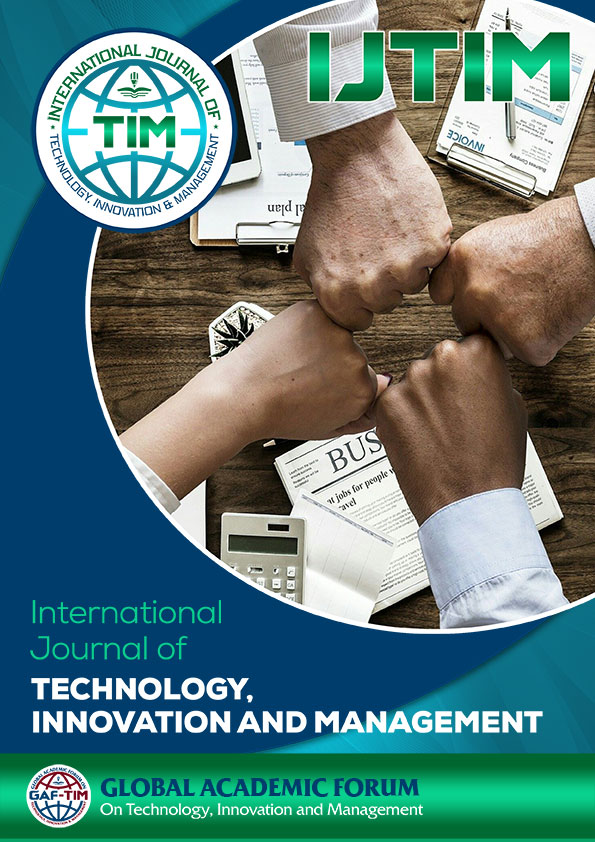Volume.4 Issue.1 - has been published
Recent Published Issue
Volume.4 Issue.1 - 2024, has been published
Jun 06, 2024
Int. J. TIM invites authors to explore papers at the recent published section.

IJTIM (TIM Journal)
In today's rapidly evolving digital landscape, it is essential to incorporate cutting-edge advancements into the academic world. With this in mind, we proudly present the International Journal of Technology Innovation and Management (IJTIM), a peer-reviewed, open-access electronic journal. Published biannually by GAFTIM, IJTIM is dedicated to serving academics and scholars worldwide by providing a credible platform for disseminating innovation and knowledge through research papers.
The International Journal of Technology Innovation and Management (IJTIM) publishes peer-reviewed articles and research papers that adopt an interdisciplinary and multidisciplinary approach, with a core focus on technology innovation and management. IJTIM explores a wide range of topics, including contemporary trends in innovation, particularly those related to the implementation of emerging technologies in businesses. The journal emphasizes both basic and applied research with the potential to impact business growth and prosperity.
IJTIM is committed to presenting and showcasing the latest academic research, both theoretical and practical, in the field of innovation and technology. The journal addresses and answers questions that aid businesses and organizations in decision-making through its articles. Additionally, IJTIM engages the academic community by fostering the development of innovative ideas related to technology.
We welcome submissions from researchers and academics from various fields and subjects. All articles and papers submitted for publication must adhere to IJTIM's publication rules. The journal reserves the right to edit and review submitted articles.
Mission
The primary mission of IJTIM is to publish original scholarly research articles that contribute to the body of knowledge in the fields of technology, innovation, and management, thereby supporting and guiding academics, industry, and society towards business growth and development. IJTIM aims to serve as a platform for academics to share their theoretical innovations and for businesses to implement these suggested innovations through technology.
Aim & Objectives
The aim of IJTIM is to disseminate knowledge and promote understanding by providing scholars and learners with up-to-date insights into the theory and practice of technology, innovation, and management. The journal contributes to the body of knowledge and sciences by publishing original empirical papers, as well as theoretical and conceptual manuscripts in select cases. The primary objective of IJTIM is to ensure that each published article maintains a state-of-the-art level without compromising quality.
Scope
The International Journal of Technology Innovation and Management (IJTIM) is a multidisciplinary platform dedicated to fostering cutting-edge research across a broad range of fields related to technology, innovation, and management. We welcome high-quality submissions from researchers and academics, focusing on both theoretical and applied research that contributes to the current knowledge base and informs decision-making processes in various industries. The journal's scope encompasses, but is not limited to, the following research areas:
IJTIM aims to serve as a platform for sharing original empirical and theoretical research that addresses contemporary challenges and opportunities in technology, innovation, and management, ultimately fostering collaboration and knowledge exchange among academics, industry professionals, and policymakers.
Readership of this Journal
The readers for International Journal of Technology, Innovation and Management are basically the academics, scholars, professionals, governmental policy makers, business seniors and/or students in this field.
Recent Published Issue
Volume.4 Issue.1 - 2024, has been published
Jun 06, 2024
Int. J. TIM invites authors to explore papers at the recent published section.


- An Open Access Journal.
- Freely available online to anyone.
- Peer-Reviewed Journal.
-International Indexing Journal.
- ISSN (2789-777X) Online.
- DOI: 10.54489/ijtim

DOI's are created using Crossref

All the articles are indexed in Google Scholar

All the published articles are archived in PKP PN

Freely available online to anyone.

Global Academic Forum on
Technology Innovation & Management
Khawarizmi Building #302
Dubai Academic City
Dubai, UAE
